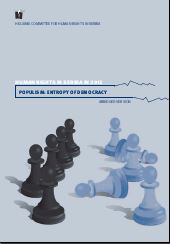Human Rights in Serbia in 2012 - Populism: Entropy of Democracy
Human Rights in Serbia in 2012 - Populism: Entropy of Democracy
Contributor(s): Sonja Biserko (Editor)
Subject(s): Politics / Political Sciences, Christian Theology and Religion, Politics, Social Sciences, Law, Constitution, Jurisprudence, Media studies, History of Church(es), Human Rights and Humanitarian Law, Communication studies, Sociology, Theology and Religion, Government/Political systems, International relations/trade, Security and defense, Military policy, Social differentiation, Eastern Orthodoxy, Ethnic Minorities Studies
Published by: Helsinški odbor za ljudska prava u Srbiji
Keywords: Serbia; human rights; populism; judiciary; military; security system; Serbia's assembly; economy; religion; ethnic minorities; media; Kosovo; international relations;
Summary/Abstract: Though formed a year ago, the Serbian government is still at the beginning – it has not yet adopted a systemic program or strategy. The structures in power are in permanent election campaign having an eye on their ratings on the one hand and demonization of the former government on the other. The biggest party of the ruling coalition, SNS, spares not even its coalition partners from criticism. SNS populist rhetoric is mainly after promoting Vice-Premier Aleksandar Vučić. The predominant populism is best exemplified by the arrest of suspects in “the struggle against corruption” and the “socially-oriented” budget for the year 2013 that subsidizes health insurance of a larger circle of citizens. All this gives rise to speculations about early elections, which are not to be ruled out. Aleksandar Vučić manifests a growing ambition to hold all the reins of power. He already controls all security services. Hence, citizens are under the impression that he is the most powerful man in Serbia. The steps the government has taken so far do not indicate its intention to reform the security sector; on the contrary, they indicate an ambition to strengthen partisan control over it. They neither indicate a plan for setting up permanent anti-corruption institutions and mechanisms. Primarily through the media controlled by parts or entire security services corruption is used for political showdowns and elimination of business competition. The security sector that has not undergone reform, operating under half-finished and legally discordant system of the democratic control and with cadres compromised on corruption will be unable to meet ambitious duties that have been allegedly imposed on it.
Series: HELSINKI SERBIA - Annual Reports on Human Rights
- Page Count: 376
- Publication Year: 2013
- Language: English
- eBook-PDF
- Introduction
- Table of Content
- Sample-PDF

